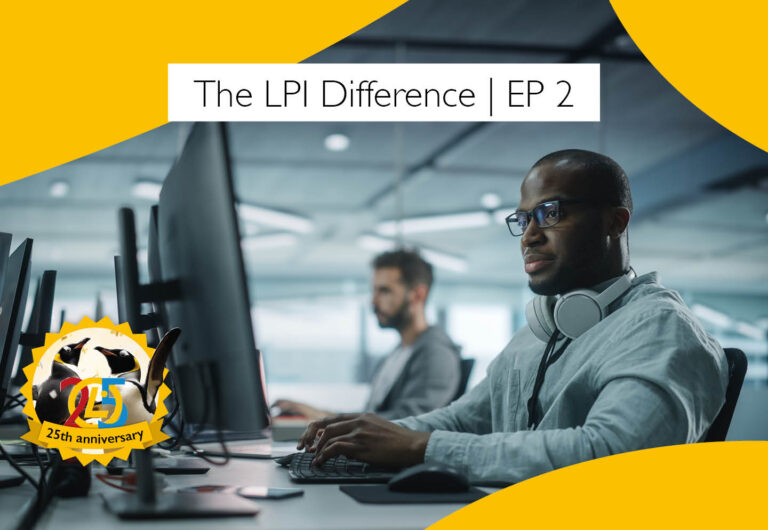The LPI Difference #2: Long-Range Thinking and Vendor Neutrality

Linux Professional Institute is celebrating its 25th anniversary as a unique organization in support of free and open source software. Although people come to LPI mostly to get professional certifications—and most of our revenue comes from certifications—our work and values go far beyond that.
Open source is special—it calls for different values and activities from other fields. This article is part of a six-part series laying out what makes LPI unique in pursuing its mission “to promote the use of open source by supporting the people who work with it.” This article discusses vendor neutrality and how it benefits LPI certification holders.
LPI was founded on the principle that we wouldn’t favor any Linux distribution or any particular open source vendor. This choice is fully in line with the free and open source promise to protect software users from dependence on a single vendor. Just consider: No one these days is running programs on PDP-series minicomputers from Digital Equipment Corporation, the systems on which the C language and Unix were first developed. So it seems like vendor neutrality would be the best bet.
If you work in a company that uses systems from Microsoft, Cisco, Oracle, or Red Hat, you might benefit from a vendor-specific certification. But what if you need to look outside your company for work? Like Digital Equipment Corporation, individual computer companies rise and fall. A vendor-independent certification provides you with more job security in the long run.
The Benefits of Linux Professional Institute’s Vendor Neutrality
In the ever-evolving landscape of IT certification, the Linux Professional Institute (LPI) stands out for its commitment to vendor neutrality. This approach not only distinguishes LPI from other certification bodies but also offers a multitude of benefits to IT professionals and organizations alike. Here’s a closer look at the advantages of LPI’s vendor-neutral certification.
1. Broad Skill Set Recognition
One of the primary benefits of LPI’s vendor neutrality is the broad recognition of skills across different Linux distributions and environments. Unlike vendor-specific certifications, which focus on proprietary technologies, LPI’s certifications cover general principles and practices that apply to a wide range of Linux systems. This means that certified professionals are not limited to one particular Linux distribution (e.g., Red Hat, Debian, or SUSE), but can adapt to various environments, making them more versatile and valuable in the job market.
2. Increased Job Marketability
Given the diverse application of Linux systems in different industries, having a vendor-neutral certification significantly enhances a candidate’s marketability. Employers often seek individuals who can operate across multiple systems without requiring additional training on specific platforms. LPI-certified professionals demonstrate a robust understanding of Linux fundamentals that transcends specific vendor implementations, making them highly attractive to potential employers.
3. Cost-Effective Learning and Certification
Vendor-neutral certifications often provide a more cost-effective pathway to certification. Because they are not tied to specific products, the study materials and exam fees are generally more affordable. This allows a wider range of candidates, including students and professionals from developing regions, to pursue certification without the financial burden associated with vendor-specific programs.
4. Up-to-Date and Relevant Curriculum
LPI’s vendor-neutral stance ensures that its certification exams are regularly updated to reflect current industry standards and practices. This relevance is maintained without the bias towards a specific vendor’s products, ensuring that the knowledge imparted is applicable and up-to-date across various Linux distributions. This continuous updating process helps IT professionals stay current with the latest advancements in Linux technology and practices.
5. Foundation for Further Specialization
LPI’s vendor-neutral certifications serve as a solid foundation for further specialization. Once professionals have a firm grasp of Linux fundamentals, they can choose to pursue more specialized, vendor-specific certifications if desired. This approach provides flexibility, allowing IT professionals to build a broad base of knowledge before delving into more specialized areas.
6. Enhanced Problem-Solving Skills
Vendor-neutral training emphasizes a deeper understanding of core principles and troubleshooting techniques that are applicable across different systems. This approach fosters stronger problem-solving skills, as certified professionals are equipped to handle a variety of issues that may arise in different Linux environments. This skill set is particularly valuable in heterogeneous IT environments where multiple Linux distributions might be in use.
7. Community and Open Source Alignment
LPI’s commitment to vendor neutrality aligns closely with the ethos of the open source community, which values collaboration, transparency, and the free exchange of knowledge. By supporting a certification that upholds these principles, professionals can position themselves as advocates for the broader open source movement, which is increasingly influential in shaping the future of technology.
The Linux Professional Institute’s vendor-neutral approach to certification provides numerous benefits that extend beyond the traditional boundaries of IT training and certification. From enhanced marketability and cost-effectiveness to the cultivation of versatile, problem-solving skills, LPI’s certifications prepare IT professionals for a dynamic and diverse technological landscape. Embracing LPI’s vendor neutrality not only broadens career opportunities but also fosters a deeper alignment with the principles that drive the open source community, ensuring that certified professionals are well-equipped to navigate the complexities of modern IT environments.
<< Read the previous post of this series | Read the next post of this series >>
